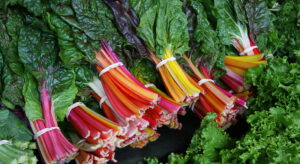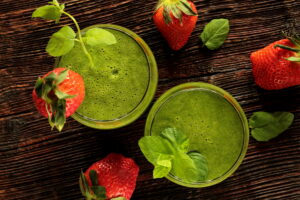An Important Health Warning You Need to Know About Leafy Greens

Dear GreenSmoothieGirl: I’m trying to eat more leafy greens. Should I be concerned about pesticides? Do I need to always buy organic?
Leafy greens are extremely nutritious. Wanting to consume more leafy greens is how I discovered green smoothies and became the GreenSmoothieGirl.
That’s why they’re called green smoothies – because you add leafy greens. (They don’t have to actually look green!)
I love my daily glasses of green goodness. But, the leafy greens you choose to eat matter for your health! I highly recommend buying organic.
Here’s what you’ll discover in this article:
- Why are leafy greens so good for you?
- Potential health concerns with leafy greens
- How to avoid pesticide exposure in leafy greens
- The best way to consume more leafy greens
Great Reasons to Consume More Leafy Greens

Swiss chard is a great leafy green to add to your green smoothies!
Leafy greens are low in calories and fat. They are also particularly rich in vitamins, minerals, and other essential nutrients.
Leafy greens include:
- Spinach
- Lettuce
- Kale
- Cabbage
- Mustard greens
- Celery
- Bok choy
- Chard
- Watercress
- And others
Consuming greens regularly has been associated with the prevention of a wide range of health conditions, such as:
- Lowering your risk of cancer1
- Significantly reducing the likelihood of getting heart disease2
- Protecting against neurodegenerative diseases, like Parkinson’s and Alzheimer’s3
- Helping you lose weight or maintain a healthy weight4
A daily serving of leafy greens can significantly lower age-related cognitive decline, according to research published in the journal Neurology.5
That’s why having at least one daily serving of leafy greens – about one cup raw or ½ cup cooked – is recommended for brain health.
One thing that makes leafy greens so powerful for your health is chlorophyll – one of the most powerful natural antioxidants.
Chlorophyll is similar to your blood and can bind to harmful substances in your body and eliminate them from your body. This detoxifies you and helps protect you from many illnesses and health concerns.
Additionally, leafy greens can help:
- Boost your immune system
- Improve your gut health
- Lower your unhealthy cravings
- Give you lasting energy
Reading the rest of this article is the perfect inspiration to join our 9-Day Green Smoothie Challenge!
[Related: The Top 11 Greens to Use in Your Green Smoothies]
Your Kale and Other Leafy Greens May Be Contaminated
So, leafy greens are fabulous for you.
But, there’s something else you need to know:
Most non-organic kale and other leafy greens are grown with cancer-causing chemicals.
Nearly 60% of kale samples tested were found to be contaminated with a possible cancer-causing pesticide that was banned in Europe 15 years ago, according to an Environmental Working Group analysis.6
While leafy greens’ popularity has soared, the amount and type of pesticide residue on kale and other leafy greens has expanded considerably.
The pesticide identified in the EWG analysis is DCPA, or Dacthal, which the U.S. EPA classified as a possible carcinogen in 1995. The EPA blamed it for increases in liver and thyroid tumors, as well as harm to the lungs, liver, kidney, and thyroid.
Non-organic kale farming relies on multiple synthetic pesticides, including DCPA.
Leafy greens, including kale, spinach, collard, and mustard greens, are regularly listed on the EWG’s Dirty Dozen list of the fruits and vegetables most contaminated with pesticides.
Over 100 pesticides were detected in kale, collard, and mustard greens – and a single sample contained up to 21 different pesticides.7
This is why I think it’s so important to buy organic greens. And talk to your grocer about how important organic-certified produce is to you.
Other Concerning Pesticides on Leafy Greens
Due to their large surface areas, leafy greens are expected to have high pesticide residue levels.
There’s no national registry of pesticides used on fruit and vegetable crops, so it’s unclear which pesticides growers are spraying.8
California is the only state that requires pesticides grown on crops in the state to be registered, so the human exposure can be tracked.
These are some of the other potentially concerning pesticides used in leafy greens:
- Organophosphates are a widely used class of pesticides that are commonly used on leafy greens – which pose potential threats to the brain and nervous system.9 They are neurotoxic to humans, posing a risk to normal neurological function and children’s development.
- In the EWG analysis, one out of every four of the leafy green samples contained two types of insecticides, bifenthrin and cypermethrin. Research shows that these pesticides are associated with adverse neurological outcomes, such as ADHD, particularly in children.9
You might be getting low doses of pesticides in leafy greens and other produce you consume. But the thing is, repeated or continuous exposure builds up over time, potentially causing serious harm to your health.
Pesticides also have the potential to damage your endocrine system – causing problems for your hormones.
Your Best Bet is to Choose Organic Leafy Greens
Even if you thoroughly wash your produce, it still may contain traces of pesticides.
Some pesticides are even systemic, meaning they are taken in by the plant’s root system and can’t be washed off.10
To reduce your pesticide exposure and the risks to your health, research has shown that organic produce has fewer pesticide residues than conventional.11
As a general rule, you should always choose the organic option for the leafy greens you’ll put into your green smoothie.
I also grow my own, in a Lettuce Grow vertical growing system, which I keep on the patio. They give you a set of free seedlings when you order a Lettuce Grow garden.
Organic leafy greens usually aren’t significantly more expensive than conventional greens – and if you’re going to consume them often, you want the cleanest and healthiest option possible.
However, if you can’t find organic, conventional produce is still a better option than processed food or animal products for your health, overall. They eat conventionally sprayed plant foods, which concentrate in animal flesh, excretions, and eggs.
[Related: Is Buying Organic Food Always Necessary?]
People Love The Results They Achieve with Green Smoothies

People love their results when consuming regular green smoothies with leafy greens
Green smoothies are great because they are the easiest way to get more leafy greens in your diet.
These are only a few of the countless testimonials we’ve received over the years from people after consuming more leafy greens in green smoothies:
“Green smoothies have changed my life! I always felt tired and cranky and always a little hungry, but as soon as I added green smoothies, I felt AWESOME! They give me everything I need. I love my green smoothies!” – Brendon C.
“Green smoothies have saved my life! I had been in a state of depression for the past 4 years. I was put on depression medicine, but it never helped. I started making a green smoothie every day, and I feel AMAZING, WONDERFUL, and FULL OF LIFE.
I have had tons of energy. I can fall asleep faster at night and feel rested when I wake up. I have had fewer cravings for sweets and processed foods, my motivation is back, and I have lost 8 pounds in 2 months. Green smoothies are here to stay!” – AB
“I have had an iron deficiency most of my life, and the green smoothies have helped tremendously!I am losing less hair in the shower as a result. My daughters love the green smoothies! They even ask for them now and love watching me make them. It is so good to be able to give them a way to get good veggies in their diet without fighting with them. Thank you for changing our way of life.” – JoAnn Y.
“I started drinking green smoothies almost three years ago and lost over 30 pounds, regained my health, and felt 10 years younger. My children never need visits to the doctor unless they have been injured. The evidence is so obvious that I cannot ever cease this miracle drink.” – Julie G.
Overall, green smoothies are ONE really easy way to get tons of raw, organic plant foods in the diet.
And THAT is the secret sauce. More raw, organic plant foods. That is the holy grail, if there is one, or the fountain of youth.
Enjoy the Benefits of Daily Leafy Greens with Our Upcoming Green Smoothie Challenge
Want an easy and delicious way to consume more leafy greens and enjoy the benefits? You can join our 9-Day Green Smoothie Challenge anytime!
The top results people experience from consuming green smoothies include more energy, improved digestion, a more positive mood, improved skin, and weight loss.
It’s a fun, uplifting experience – and an excellent way to reawaken your hope and health.
When you join our FREE challenge – 20,000 people have taken it so far! – we’ll send you:
- Daily recipes with videos,
- A shopping list,
- Exclusive deals for your smoothie success, insider tips,
- And an invitation to a private, supportive community on Facebook

Disclosure: This post may contain affiliate links that help support the GSG mission without costing you extra. I recommend only companies and products that I use myself.

References
- Zhang, Y. (2004). Cancer-preventive isothiocyanates: measurement of human exposure and mechanism of action. Mutation Research. https://doi.org/10.1016/j.mrfmmm.2004.04.017
- Pollock, R. L. (2016). The effect of green leafy and cruciferous vegetable intake on the incidence of cardiovascular disease: A meta-analysis. JRSM Cardiovascular Disease. https://doi.org/10.1177/2048004016661435
- Nwanna, E.E., Oyeleye, O.B., Oboh, A. A, Boligon, & Athayde, M.L. (2016). In vitro neuroprotective properties of some commonly consumed green leafy vegetables in Southern Nigeria. NFS Journal.
- Bertoia, M. L., Mukamal, K. J., Cahill, L. E., Hou, T., Ludwig, D. S., Mozaffarian, D., Willett, W. C., Hu, F. B., & Rimm, E. B. (2015). Changes in Intake of Fruits and Vegetables and Weight Change in United States Men and Women Followed for Up to 24 Years: Analysis from Three Prospective Cohort Studies. PLoS Medicine. https://doi.org/10.1371/journal.pmed.1001878
- Leafy greens linked with slower age-related cognitive decline. National Institute on Aging. https://www.nia.nih.gov/news/leafy-greens-linked-slower-age-related-cognitive-decline
- Temkin, A. Almost six out of 10 kale samples tainted by pesticide banned in Europe 15 years ago. EWG.com.
- EWG Science Team. (2024). EWG’s 2024 Shopper’s Guide to Pesticides in Produce™.
- Park, A. (2019). Kale Is One of the Most Contaminated Vegetables You Can Buy. Here’s Why. TIME.
- Kamel, F., & Hoppin, J. A. (2004). Association of pesticide exposure with neurologic dysfunction and disease. Environmental Health Perspectives. https://doi.org/10.1289/ehp.7135
- Eat the peach, not the pesticide. Consumer Reports. https://www.consumerreports.org/cro/health/natural-health/pesticides/index.htm
- Curl, C. L., Beresford, S. A., Fenske, R. A., Fitzpatrick, A. L., Lu, C., Nettleton, J. A., & Kaufman, J. D. (2015). Estimating pesticide exposure from dietary intake and organic food choices: the Multi-Ethnic Study of Atherosclerosis (MESA). Environmental Health Perspectives. https://doi.org/10.1289/ehp.1408197
Image Notes
- Swiss chard image used under a CC BY 2.0 DEED Attribution 2.0 Generic license on Flickr by eflon
Posted in: Green Smoothies, Health Concerns, Healthy Weight, Whole Food














